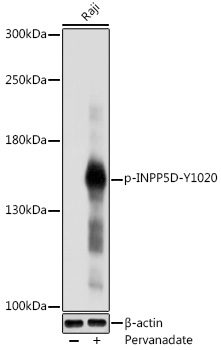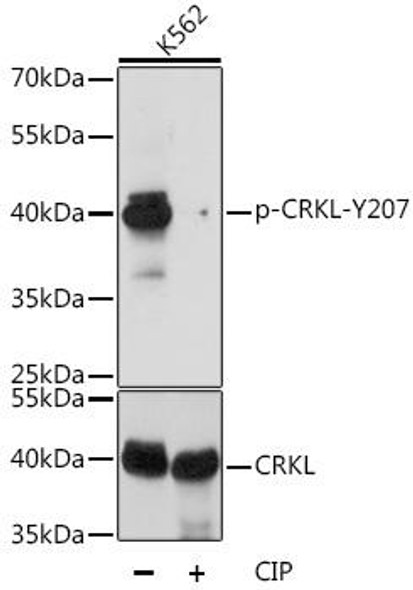Cell Death Antibodies 2
Anti-Phospho-INPP5D-Y1020 pAb Antibody (CABP0778)
- SKU:
- CABP0778
- Product Type:
- Antibody
- Applications:
- WB
- Reactivity:
- Human
- Host Species:
- Rabbit
- Isotype:
- IgG
- Research Area:
- Cell Death
Description
| Antibody Name: | Anti-Phospho-INPP5D-Y1020 Antibody |
| Antibody SKU: | CABP0778 |
| Antibody Size: | 20uL, 50uL, 100uL |
| Application: | WB |
| Reactivity: | Human |
| Host Species: | Rabbit |
| Immunogen: | A synthetic phosphorylated peptide around Y1020 of human INPP5D (NP_001017915.1). |
| Application: | WB |
| Recommended Dilution: | WB 1:500 - 1:2000 |
| Reactivity: | Human |
| Positive Samples: | Raji |
| Immunogen: | A synthetic phosphorylated peptide around Y1020 of human INPP5D (NP_001017915.1). |
| Purification Method: | Affinity purification |
| Storage Buffer: | Store at -20°C. Avoid freeze / thaw cycles. Buffer: PBS with 0.02% sodium azide, 50% glycerol, pH7.3. |
| Isotype: | IgG |
| Sequence: | ENPL Y |
| Gene ID: | 3635 |
| Uniprot: | Q92835 |
| Cellular Location: | Cytoplasm, Membrane, Peripheral membrane protein |
| Calculated MW: | 109kDa/133kDa |
| Observed MW: | 145KDa |
| Synonyms: | INPP5D, SHIP, SHIP-1, SHIP1, SIP-145, hp51CN, p150Ship |
| Background: | This gene is a member of the inositol polyphosphate-5-phosphatase (INPP5) family and encodes a protein with an N-terminal SH2 domain, an inositol phosphatase domain, and two C-terminal protein interaction domains. Expression of this protein is restricted to hematopoietic cells where its movement from the cytosol to the plasma membrane is mediated by tyrosine phosphorylation. At the plasma membrane, the protein hydrolyzes the 5' phosphate from phosphatidylinositol (3, 4, 5)-trisphosphate and inositol-1, 3, 4, 5-tetrakisphosphate, thereby affecting multiple signaling pathways. The protein is also partly localized to the nucleus, where it may be involved in nuclear inositol phosphate signaling processes. Overall, the protein functions as a negative regulator of myeloid cell proliferation and survival. Mutations in this gene are associated with defects and cancers of the immune system. Alternative splicing of this gene results in multiple transcript variants. |
| UniProt Protein Function: | SHIP: an SH2-containing inositol phosphatase. A hemopoietic-specific phosphatase that regulates cell survival, growth, cell cycle arrest and apoptosis. Hydrolyzes Ins(1,3,4,5)P4 and PtdIns(3,4,5)P3. A cytosolic protein with a SH2 domain in its N-terminus and two NPXY Shc binding motifs at its C-terminus. Upon receptor cross-linking, SHIP is first recruited to the plasma membrane by its SH2, followed by tyrosine phosphorylation on the NPXY motif. Both membrane relocalization and phosphorylation are essential for its regulatory function. Associates with SHC after cytokine stimulation. |
| UniProt Protein Details: | Protein type:Phosphatase, lipid; EC 3.1.3.86; Motility/polarity/chemotaxis Chromosomal Location of Human Ortholog: 2q37.1 Cellular Component: cytoskeleton; cytosol; lipid raft; plasma membrane Molecular Function:inositol-polyphosphate 5-phosphatase activity; protein binding; PTB domain binding; SH3 domain binding Biological Process: apoptosis; blood coagulation; determination of adult life span; immunoglobulin mediated immune response; inositol phosphate metabolic process; leukocyte migration; negative regulation of B cell proliferation; negative regulation of bone resorption; negative regulation of immune response; negative regulation of interleukin-6 biosynthetic process; negative regulation of monocyte differentiation; negative regulation of neutrophil differentiation; negative regulation of osteoclast differentiation; negative regulation of signal transduction; phosphate metabolic process; phosphatidylinositol biosynthetic process; phosphoinositide dephosphorylation; phospholipid metabolic process; positive regulation of apoptosis; positive regulation of B cell differentiation; positive regulation of erythrocyte differentiation; signal transduction; T cell receptor signaling pathway |
| NCBI Summary: | This gene is a member of the inositol polyphosphate-5-phosphatase (INPP5) family and encodes a protein with an N-terminal SH2 domain, an inositol phosphatase domain, and two C-terminal protein interaction domains. Expression of this protein is restricted to hematopoietic cells where its movement from the cytosol to the plasma membrane is mediated by tyrosine phosphorylation. At the plasma membrane, the protein hydrolyzes the 5' phosphate from phosphatidylinositol (3,4,5)-trisphosphate and inositol-1,3,4,5-tetrakisphosphate, thereby affecting multiple signaling pathways. The protein is also partly localized to the nucleus, where it may be involved in nuclear inositol phosphate signaling processes. Overall, the protein functions as a negative regulator of myeloid cell proliferation and survival. Mutations in this gene are associated with defects and cancers of the immune system. Alternative splicing of this gene results in multiple transcript variants. [provided by RefSeq, Feb 2014] |
| UniProt Code: | Q92835 |
| NCBI GenInfo Identifier: | 158564077 |
| NCBI Gene ID: | 3635 |
| NCBI Accession: | Q92835.2 |
| UniProt Secondary Accession: | Q92835,O00145, Q13544, Q13545, Q6P5A4, Q92656, Q9UE80 |
| UniProt Related Accession: | Q92835 |
| Molecular Weight: | 109,294 Da |
| NCBI Full Name: | Phosphatidylinositol 3,4,5-trisphosphate 5-phosphatase 1 |
| NCBI Synonym Full Names: | inositol polyphosphate-5-phosphatase D |
| NCBI Official Symbol: | INPP5D |
| NCBI Official Synonym Symbols: | SHIP; SHIP1; SHIP-1; hp51CN; SIP-145; p150Ship |
| NCBI Protein Information: | phosphatidylinositol 3,4,5-trisphosphate 5-phosphatase 1 |
| UniProt Protein Name: | Phosphatidylinositol 3,4,5-trisphosphate 5-phosphatase 1 |
| UniProt Synonym Protein Names: | Inositol polyphosphate-5-phosphatase of 145 kDa; SIP-145; SH2 domain-containing inositol 5'-phosphatase 1; SH2 domain-containing inositol phosphatase 1; SHIP-1; p150Ship; hp51CN |
| Protein Family: | Phosphatidylinositol 3,4,5-trisphosphate 5-phosphatase |
| UniProt Gene Name: | INPP5D |
| UniProt Entry Name: | SHIP1_HUMAN |







